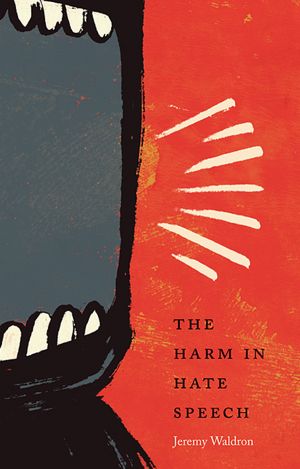"Should hate speech be outlawed?" This is the provocative title of John Paul Stevens's review, in the New York Review of Books, of The Harm in Hate Speech (Harvard University Press), by legal philosopher Jeremy Waldron (New York University). The book is a published version of the Oliver Wendell Holmes lectures that Waldron delivered at Harvard University in 2009. In Waldron's view, Stevens writes, "we have overprotected speech that not only causes
significant harm to the dignity of minority groups but also, more
importantly, diminishes the public good of inclusiveness that is an
essential attribute of our society."
Disease Maps: Epidemics on the Ground (University of Chicago Press), by medical geographer Tom Koch, has top billing over at the New Republic: The Book (here). Reviewer Howard Markel offers great praise for this "sumptuous exploration of epidemics of the distant past and the geographical analyses that explained and transformed them."
In the book pages of the New York Times, you'll find a review of Land of Promise: An Economic History of the United States (Harper/HarperCollins), by Michael Lind. Reviewer David Leonhardt describes the book as "ambitious" and "rich with details." Starting from the concept of dueling traditions of political economy, Lind takes the controversial position that “[w]hat is good about the American economy is largely the result of the Hamiltonian developmental tradition, and what is bad about it is largely the result of the Jeffersonian producerist school.” Read on here.
The New York Times also covers, here, Those Who Have Borne the Battle: A History of America’s Wars and Those Who Fought Them (PublicAffairs), by veteran, historian, and former Dartmouth College president James Wright. According to reviewer Andrew J. Bacevich (Boston University), the book focuses on "how the United States has raised the forces with which it wages war; and how, in the aftermath of battle, it cares for and remembers those who fought."
Elsewhere in the NYT, another Ivy League President: the "By the Book" column spotlights historian Drew Gilpin Faust. Asked about "a book that prepared [her] for academic life in some way," she mentions "Amanda Cross’s murderous take on academic life" and, "[i]n a more serious vein, . . . Clark Kerr’s 'The Uses of the University.'"As for a book she "wish[es] all incoming freshmen at Harvard would read," she picks "Kathryn Schulz’s 'Being Wrong,'" which, in Faust's words, "advocates doubt as a skill and praises error as the foundation of wisdom." Read on here.
Mary Dudziak's Wartime continues to inspire discussion. This week Samuel Moyn (Columbia University) reviewed the book for Lawfare, here. Dudziak's response is here, at Balkinization.
In the Wall Street Journal, you'll find reviews of Political Woman: The Big Little Life of Jeane Kirkpatrick (Encounter), by Peter Collier, here, and The Admirals: Nimitz, Halsey, Leahy, and King--The Five-Star Admirals Who Won the War at Sea (Little, Brown), by Walter R. Borneman, here.
In the book pages of the Nation, Stephen F. Cohen (Princeton University) and Peter Reddaway (George Washington) take on, here, Orlando Figes's much acclaimed The Whisperers: Private Life in Stalin's Russia (2007). Did Vladimir Putin's regime "in effect ban[] a Russian edition" of the book? Cohen and Reddaway think not.


